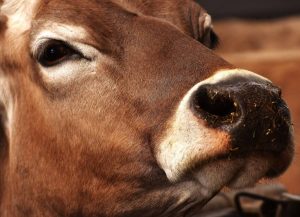Alvaro Garcia
Current concerns about greenhouse gas production by ruminants have researchers looking for different feeding strategies. Methane of enteric origin has been considered a significant contributor to this problem. Dietary carbohydrate composition influences rumen fermentation pattern and methane production. Starch and sugars are easily fermentable in the rumen, but with different patterns, volatile fatty acids profiles, and in consequence, methane production.
In modern dairy cow production, starch and fiber are by weight the main nutrients contributing to the diet. It is logical then to attempt to focus on them in order to have a significant effect in methane reduction. Whenever more hydrogen is produced during rumen fermentation (mainly fiber) more methane will be the end-product. There is not a lot of information however on the effects of replacing starch with sugars. It is known that a reduction in rumen pH favors propionate production. These changes lead to inhibition of fiber degrading bacteria and methanogenesis, enhanced propionate, and as a result reduced methane production.
A recent experiment (Børsting et al., 2020) looked at methane emissions and its relationship with two different carbohydrate supplements. The forage base was late first-cut grass–clover silage with a low (<10% of dry matter; DM) clover proportion. Diets were supplemented with rolled wheat or sugar beet molasses, which made up 35% of the diet DM in both diets. Other ingredients were soybean meal, mineral and vitamin supplements.
Dry matter intake was lower for the wheat (16.6 kg) compared to the molasses (17.9 kg) diet. Organic matter digestibility was not affected by diet in any part of the digestive tract, and organic matter total-tract digestibility was on average 75.8%. Intake of starch was highest on the wheat diet (3.77 kg) compared to the molasses diet (0.26 kg). Rumen digestibility of starch in the molasses diet was lower (32.3%) compared to the wheat diet (87.8%). As expected, sugar intake was higher in the molasses diet (4.33 kg) compared with the wheat diet (0.57 kg). Total-tract digestibility of fiber was lower in the wheat diet (64.6%) than in the molasses diet (67.9%). Small intestinal digestibility of protein was higher in the wheat (73.8%) than in the molasses diet (65.0%). Total volatile fatty acids concentration and acetate and propionate proportions were not affected by treatments. There were also no effects of diet on total microbial protein synthesis and its efficiency.
Replacing wheat with molasses increased methane production from 547 for the wheat diet to 671 liters/day on the molasses diet. The wheat diet led to higher milk production (22.2 vs. 19.3 kg/d) and energy-corrected-milk (23.7 vs. 22.1 kg/d) compared to the molasses diet. The concentration of fat (4.81 vs. 4.44%) and protein (4.15 vs. 3.99%) was higher in the molasses than in the wheat diet. Lactose content was significantly lower in the molasses diet than in the wheat diet (4.61 vs. 4.70%).
This experiment led to two important conclusions. First that wheat grain supplementation in lactating dairy cows resulted in higher milk production than molasses. Second that increasing the sugar:starch ratio by using molasses as supplement increased methane production per kilogram of DM intake.
Reference:
Børsting, C.F., Brask, M., Hellwing, A.L.F., Weisbjerg, M.R., Lund, P. 2020. Enteric methane emission and digestion in dairy cows fed wheat or molasses. Journal of Dairy Science: 103(2): 1448-1462.
© 2020 Dairy Knowledge Center, LLC. All Rights Reserved.









